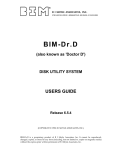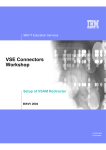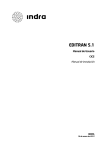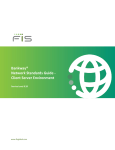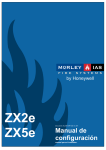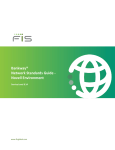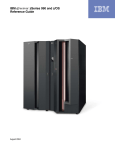Download z/VSE service terms
Transcript
IBM z Systems – z/VSE – VM Workshop 2015 z/VSE Release Migration and Installation Hints & Tips Ingo Franzki © 2015 IBM Corporation IBM z Systems – z/VSE – VM Workshop 2015 Agenda Overview Status information – z/VSE, z/VM – Server & storage support Hardware upgrades & migration z/VSE service terms Service deliverables Ordering products and service – How to find available APARs / PTFs – How to apply electronic PTFs Migration tasks – Planning – Fast Service Upgrade (FSU) – Initial Installation – Post migration tasks Data migration after upgrade Service recommendation 4 © 2015 IBM Corporation IBM z Systems – z/VSE – VM Workshop 2015 Overview Hardware Migration – New System z box – Add more capacity (processors, capacity setting) IBM = Install Bigger Machine – New disks, tapes, cards, etc – Move to a new datacenter Software Migration – New z/VSE release or version – New z/VM release or version – New (homegrown or purchased) Application – Add new or additional workload – Update the service level (apply PTFs) 5 © 2015 IBM Corporation IBM z Systems – z/VSE – VM Workshop 2015 z/VSE & z/VM Release Status z/VSE: http://www.ibm.com/systems/z/os/zvse/about/status.html#vse Note: z/VSE V6.1 requires an initial installation. To ease the migration to z/VSE V6.1, z/VSE V5.2 will still be orderable after general availability of z/VSE V6.1 for a transition period. z/VM: http://www.vm.ibm.com/techinfo/lpmigr/vmleos.html 6 © 2015 IBM Corporation IBM z Systems – z/VSE – VM Workshop 2015 z/VSE Server Support http://www.ibm.com/systems/z/os/zvse/about/status.html#server For older and unsupported release, please see here: http://www.ibm.com/systems/z/os/ zvse/about/statusold.html#server 7 © 2015 IBM Corporation IBM z Systems – z/VSE – VM Workshop 2015 z/VSE Storage Support http://www.ibm.com/systems/z/os/zvse/about/status.html#storage 8 © 2015 IBM Corporation IBM z Systems – z/VSE – VM Workshop 2015 Hardware Upgrades & Migrations Order related PSP (Preventive Service Package) before migrating to the new hardware http://www.ibm.com/systems/z/os/zvse/support/preventive.html#psp – e.g. search for “2827DEVICE” (2827 = zEC12): Concurrent microcode upgrade for IBM System Storage – ECKD disks: z/VSE recommends to shutdown the z/VSE system prior to the microcode upgrade. – FCP-attached SCSI disks: z/VSE does not support concurrent microcode upgrade for FCP-attached SCSI disks. Recommendation for IBM Tape Storage: – z/VSE with the latest service level supports concurrent microcode upgrade for IBM Tape Storage – z/VSE recommends to take the tape units offline (z/VSE OFFLINE command) prior to the microcode upgrade or use the next maintenance window – Once the upgrade completed, take the tape units online again (z/VSE ONLINE command) – Please check with your software vendors (e.g. tape management systems), if they support concurrent microcode upgrade. 9 © 2015 IBM Corporation IBM z Systems – z/VSE – VM Workshop 2015 Hardware Upgrades & Migrations New processor – At first IPL on new processor, you will see ‘OVERLAP ON UNEXPIRED FILE’ messages • Page dataset • Label area (old systems only, newer systems use VDISK) Enter DELETE to let it reformat the page dataset – For a shared system • Make sure CPUID is changed in in ASIPROC • Check DLF NCPU parameter is still sufficient OSA/SF for SNA configuration 10 Adapter OSA/SF in HMC OSA/SF (latest PTFs) OSA Express 3 No Yes OSA Express 4S Yes Yes OSA Express 5S Yes No © 2015 IBM Corporation IBM z Systems – z/VSE – VM Workshop 2015 Hardware Sizing and Capacity Planning Sizing a system for z/VSE is different from sizing a system for z/OS – In general, a faster single CPU is better than multiple smaller CPUs IBM Processor Capacity Reference for System z (zPCR) – It is designed to provide capacity planning insight for IBM System z processors running various workload environments – Capacity results are based on IBM's LSPR data supporting all IBM System z processors – Large System Performance Reference: http://www.ibm.com/systems/z/advantages/management/lspr/ – For VSE use z/VSE workloads Batch, Online or Mixed – http://www.ibm.com/support/techdocs/atsmastr.nsf/WebIndex/PRS1381 – ‘As is’, no official support, e-mail to [email protected] A z/VSE Capacity Planning Offering is now available – Available for Business Partners and Customers – Performance data collection is based on a new version of the CPUMON Tool – Analysis is done using zCP3000 – Contact [email protected] and ask for z/VSE Capacity Planning Support 11 © 2015 IBM Corporation IBM z Systems – z/VSE – VM Workshop 2015 Some Terms and Definitions Version / Release / Modification Level – z/VSE 5.1.2 = Version 5, Release 1, Modification Level 2 – Version and Release start counting at 1 – Modification Level starts counting at 0 • At GA of a new Version or Release, the Modification Level is zero • z/VSE 5.2 GA = z/VSE 5.2.0 Refresh or Refresh Level – Same as a new Modification Level • e.g. z/VSE 5.1.1 is a Refresh of z/VSE 5.1(.0) – When you order z/VSE you always get the newest Refresh Level – SPE = Small Programming Enhancement (usually as part of a Refresh) GA Version (GA = Globally Available) – The service level at the time the Version or Release becomes available – Usually no PTFs applied (vanilla system) PTF-1 – A set of PTFs that are already available at the time of GA – Fixes problems that have been found between shipment to the distribution centers, and GA – It is strongly recommended to order and apply those PTFs right after or during migration! 12 © 2015 IBM Corporation IBM z Systems – z/VSE – VM Workshop 2015 Some Terms and Definitions - continued HIPER = High Impact or Pervasive APAR – An APAR that was flagged as especially important • Data loss, integrity • Device or hardware specific PSP bucket = Preventive Service Planning – PSP buckets contain all HIPER PTFs • For a specific set of products or components • On a given z/VSE refresh level – http://www14.software.ibm.com/webapp/set2/psearch/search?domain=psp RSL = Recommended Service Level – Fills the gap between z/VSE refresh levels and the HIPER service (PSP buckets) – An RSL consists of a list of ALL APAR/PTF numbers, not only the HIPER service. • which are available at specific cutoff dates – RSLs are updated more frequently than refreshes – http://www-03.ibm.com/systems/z/os/zvse/support/preventive.html#rsl Installed Software Report Tool (ISR Tool) – To be used with Shopz service orders – Report contains a list of products and PTFs that are already installed on your system • MSHP RETRACE PRODUCT and RETRACE PTFS • Allows Shopz to ship only those PTFs that are not applied 13 © 2015 IBM Corporation IBM z Systems – z/VSE – VM Workshop 2015 z/VSE Service Deliverables Priority 1: Stay on a supported level frequency Make sure that your system is always on a supported level to get help and support from IBM when you need it Corrective Service Plan ahead sufficient time for release or version upgrade and for PTF installation Consult your software vendors for upgrades and specific information 14 Preventive Service Refresh RSL PSP PTF What is it Complete Product (includes all PTFs) List of ALL PTFs at a cut off day List of selected PTFs (HIPER) Official Fix for a code problem (APAR) When is it available Every 6-12 Month, usually for the newest release Every 2-3 Month Is constantly kept up to date Will be created when a fix is available When should it be installed For base install or Fast Service Upgrade (FSU) Preventive to stay on an current level After a refresh installation and preventive to avoid HIPER problems To fix a certain problem © 2015 IBM Corporation IBM z Systems – z/VSE – VM Workshop 2015 Ordering Products and Service Order a new z/VSE System or a Refresh – You get 2 (or 3) tapes (as AWS images) • z/VSE Base Tape • z/VSE Extended Base Tape • (DB2 Help Texts) – For Base Install – Or Fast Service Upgrade (FSU) IBM Shopz: http://www.ibm.com/software/shopzseries Order Optional Products – You get 1 to N stacked tapes (as AWS images) – To be installed through Interactive Interface dialogs Order APARs, PTFs, RSLs, PSPs – You get a set of PTFs – As binary file with LRECL 80 (most likely zipped to save download time) – Apply via Interactive Interface dialogs • Through PTF.FILE (IJSYSPF) • Or VTAPE 15 © 2015 IBM Corporation IBM z Systems – z/VSE – VM Workshop 2015 Information about APARs and PTFs http://www.ibm.com/systems/z/os/zvse/support/corrective.html http://www14.software.ibm.com/webapp/set2/ psearch/search?domain=sysz 16 © 2015 IBM Corporation IBM z Systems – z/VSE – VM Workshop 2015 Recommended Service Levels and PSP Buckets PSP Buckets http://www.ibm.com/systems/z/os/zvse/support/preventive.html#psp e.g. search for “ZVSE510” or “ZVSE431” Recommended Service Levels (RSLs) http://www.ibm.com/systems/z/os/zvse/support/preventive.html#rsl Copy & Paste the entire PTF order list into ShopZ – Don’t worry about the text around, ShopZ will filter out anything that’s not a PTF number 17 © 2015 IBM Corporation IBM z Systems – z/VSE – VM Workshop 2015 IBM Subscription Services Get notified when APARs are closed https://www-947.ibm.com/systems/support/myview/subscription/css.wss/folders?methodName=listMyFolders 18 © 2015 IBM Corporation IBM z Systems – z/VSE – VM Workshop 2015 Ordering PTFs using IBM Shopz http://www.ibm.com/software/shopzseries ZIP file contains Shipptfs.bin (BINARY, LRECL 80 MSHP PTF data) 19 © 2015 IBM Corporation IBM z Systems – z/VSE – VM Workshop 2015 Applying electronic PTFs http://www.ibm.com/systems/z/os/zvse/documentation/edelivery.html#eptf Using upload (TCP/IP FTP or IN$FILE) – Upload this file into PTF.FILE (IJSYSPF) in BINARY with LRECL 80 – Apply service using the Interactive Interface dialog (1423) • Service Medium is DISK Using VTAPE – Rename Shiptfs.bin to Shiptfs.ptf – Apply service using the Interactive Interface dialog (1423) • Service Medium is TAPE • Select to use virtual tape • On panel UTL$VTA2 specify the IP address or hostname of your PC or workstation (where the VSE Virtual Tape Server runs) • Also specify the full qualified path and file name of the shiptfs.ptf file where it resides on your PC or workstation PTF files should NOT be transferred directly to the z/VSE system (POWER reader), because – PRE- and CO-requirements may not be fulfilled due to wrong order of PTFs, CO-requirements will not work at all – POWER JECL included in the data part of the PTFs will be processed while running the job • This leads to modified contents of the PTF and also might cause the code to be incomplete – Missing POWER JECL in the PTF file causes POWER to extract VSE JOB cards, this also leads to modified contents of the PTF and may also be incomplete due to job termination – No indirect application possible 20 © 2015 IBM Corporation IBM z Systems – z/VSE – VM Workshop 2015 Migration tasks Planning for a migration – Order latest updates, Products, PTFs, RSLs, PSPs, etc – Order latest Vendor products and updates – Consider system layout changes (if needed) – Performance • Activate a performance monitor • Keep monitor data from old and new system for an extended time frame – Testing • Make sure test systems are available to test the migration first • Plan for an extended testing phase • Test your applications, your data, performance • Test with high load, with lots of users, lots of data, etc – Plan for final cutover • Data migration (reorganization, reformat, etc) • Keep an old system just in case (as backup or live) – Plan for fallback • Make sure you have a proper backup available • Migrating data back might be tricky, if new features have been used on new system 21 © 2015 IBM Corporation IBM z Systems – z/VSE – VM Workshop 2015 Migration tasks - continued Fast service Upgrade (FSU) – FSU will update IBM provided parts like • System Libraries • ICCF members • System Files (e.g. Online Message Explanation (OME) – But keep all user data, applications and products installed Initial Installation – Initial Installation will just establish the z/VSE system – User data, applications and additional products need to be reestablished – Usually Initial Installation is done on a test system (LPAR or VM guest) Situations when an Initial Installation is required: – Previous system is too old, In general FSU allows to upgrade only two releases/versions. – No FSU from VSE/ESA 2.3 and earlier. – Change of system disk architecture, like switching from ECKD to FBA SCSI. – Change of the system language (actually only Japanese and English is supported) – Change of environment like change to C (big). However this can be switched manually after FSU. 22 © 2015 IBM Corporation IBM z Systems – z/VSE – VM Workshop 2015 Performing a Fast Service Upgrade (FSU) FSU requires a z/VSE base tape – On physical cartridge – As VSAM VTAPE (use FTP to upload AWS file into a VSAM ESDS cluster) Checklist for FSU – PRD2.SAVE contains all current startup procedures, label procedures, current DTSECTAB • especially procedures with same name as shipped procedures – PRD2.CONFIG contains all configurable files like CICS tables, TCPIP configuration, VTAM startup – Check if own POWER phase and allocation • specify accordingly in FSU dialog. DTRPOWR.PROC refers to all POWER files? Run POWER generation at the end of Stage 1 – Consider to establish startup with separate JCL procedures without activating vendor software, especially with external security manager Downlevel Check – This is an installation check showing service to be re-installed after FSU – Does not change the system – Makes no sense in case of a release/version upgrade, but important for installing a refresh FSU Preparation – This step is very important! – Establishes the new FSU code and enables it on the old system – AFTER Preparation has been completed, generate the FSU job stream • If you generate it before, then it will not work 23 © 2015 IBM Corporation IBM z Systems – z/VSE – VM Workshop 2015 Performing a Fast Service Upgrade (FSU) - continued FSU Installation – Stage 1: • IJSYSRS onto SYSWK1 including NLS parts • PRD1.MACLIB • PRD2.GEN1 (optional will be cleared if not selected) • Prepare JCL for Stage 2 • At the end of Stage1 generate POWER phase – Re-IPL from SYSWK1 • Using a special FSU JCL and normal IPL procedure • OEM products are not started – Stage 2: • Restore ICCF parts, base and NLS (IBM libraries only) • Install of PRD2.SCEEBASE (LE) and PRD1.BASE (CICS, VTAM, etc) • Refresh OME • Refresh Text Repository File, upgrade CSD • Clear local and global catalog for a so called ice-cold start of CICS • Install DB2 (optional) • Reorganize DTSFILE (optional) • Copy back IJSYSR1 – Stage 2 runs without CICS, TCPIP, VTAM • at the end basic CICS and VTAM are started 24 © 2015 IBM Corporation IBM z Systems – z/VSE – VM Workshop 2015 Performing a Fast Service Upgrade (FSU) - continued Post FSU tasks – Update your default selection panels and your default application profiles – Shutdown the system and re-IPL from DOSRES – Re-catalog or recompile your modified configuration members using the new skeletons • Startup procedures • VTAM books • CICS tables • LE/VSE runtime options CEEDOPT and CEEWCOPT • Node error and auto install programs • etc. – Re-install optional and extended base products – Re-install vendor products or install service – Install RSL and PSP – Generate SA Dump disk or tape – Migrate to the new Security concept (if not already done) For additional information please see – System Upgrade and Service manual – Program Directory 25 © 2015 IBM Corporation IBM z Systems – z/VSE – VM Workshop 2015 Performing an Initial Installation Initial Installation requires a physical z/VSE base tape on cartridge (IPL’able) – VTAPE is not supported – You may need to copy the base tape from AWS (VTAPE) onto a physical tape – z/VSE 5.2 or later: Tapeless installation using installation disk IPL the z/VSE base tape – Initial Installation will start – Choose automatic install and enter required information – Remaining process runs mainly automatic After Initial Installation, optional and vendor products must be installed – Startup procedures and hardware must be configured – VSAM catalogs and data must be established – POWER Files must be loaded – CSD File needs to be updated – DTSFILE (ICCF) user libraries restore – DB2 and DLI data if available, install and restore database – Security setup (IESCNTL and BSTCNTL) – Other data must be restored or imported – Generate SA Dump disk or tape 26 © 2015 IBM Corporation IBM z Systems – z/VSE – VM Workshop 2015 z/VSE 5.2: Tapeless Initial Installation Step 1: Create a z/VSE Installation Disk 27 Step 2: Install from Disk © 2015 IBM Corporation IBM z Systems – z/VSE – VM Workshop 2015 Post Migration Tasks SA Dump – Generate SA dump to disk (recommended) or tape – IUI dialog fast path 461 or 462 Dump Library – Dump library is now a VSAM library (since z/VSE 5.1), which is more flexible in space – Space is allocated in master catalog – Space allocation is dependent on environment selected – FSU will not move, if wished, moving to VSAM can be done using skeleton SKDMPEXT Install latest PTFs, RSLs, PSPs, Vendor product updates, etc Verification and Test – Check your security setup – User Profiles – Check VSAM catalogs using the catalog checker – Test applications 28 © 2015 IBM Corporation IBM z Systems – z/VSE – VM Workshop 2015 Data Migration after Upgrade VSAM (not required for FSU, but recommended) – VSAM Backup/Restore – VSAM catalogs with EXPORT-DISCONNECT and IMPORT-CONNECT – Please carefully check definition of models used for workfiles on other disks than DOSRES or SYSWK1 – Entire catalogs can also be copied using Flashcopy • For each catalog, all disks where it owns space has to be flashed • Be aware that disks have to have same model type, e.g. 3390-3. Other data – Entire disks can be copied using: • FCOPY • IXFP Flashcopy • DDR Copy of system disks – For the two system disk, make sure in case of DDR that the system is down – For FCOPY standalone-FCOPY is recommended for the system packs – If the master catalog or VSESPUC catalog have storage on disks other than DOSRES or SYSWK1, these volumes also have to be saved 29 © 2015 IBM Corporation IBM z Systems – z/VSE – VM Workshop 2015 Data Migration after Upgrade - continued POWER – Migration with POFFLOAD on a tape (VTAPE) – Shared Spool • Conversion of POWER files is not recommended, POFFLOAD and cold start from the master system is recommended CICS CSD File – FSU and Initial Installation will update/establish IBM provided groups – User definitions might have to be migrated Databases – DLI • Take data base backups • Data base can also be migrated • Be aware of different releases, DLI 1.10 on CICS/VSE and DL/I 1.11 are no longer supported (z/VSE 4.3.x and higher). Migration to DL/I 1.12 is required. • Do not use disk copies (DDR or FCOPY) while data base is in use – DB2 • Use DB2 Data Restore feature 30 © 2015 IBM Corporation IBM z Systems – z/VSE – VM Workshop 2015 Data Migration after Upgrade - continued ICCF and DTSFILE – FSU will update IBM libraries only (1, 2, 50-69) • User libraries are untouched – After Initial Installation user libraries need to be restored • Do not migrate IBM libraries ! User profiles – No change to VSE Control File (IESCNTL) during FSU – Migration with IESBLDUP utility after Initial Installation • All user profiles, user defined selections and application definitions will be migrated • The VSE Control File of the original System and a Backup of the ICCF DTSFILE is needed • After IESBLDUP job, use PF6=GROUPS in dialog „Maintain User Profiles” to update BSTCNTL with user definition Security Files (BSM Control File and DTSECTAB) – FSU Stage 2 will run without batch security • original DTSECTAB phase if saved in PRD2.SAVE is re-established. • BSTCNTL is updated (transaction security) by FSU – Initial installation will establish a fresh BSM Control File • all user specific security settings must be migrated using skeleton SKBSTSAV • Don't copy this file using VSAM REPRO or similar • DTSECTAB has to be re-established 31 © 2015 IBM Corporation IBM z Systems – z/VSE – VM Workshop 2015 Things that should NOT be changed Don't change library structure – IJSYSRS, PRD1, PRD2, SYSDUMP Don't change catalog layout, especially storage for master and user catalog VSESP.USER.CATALOG (VSESPUC) Control files IESCNTL and BSTCNTL must be unique in the system and accessible by BSM (FB partition) and each CICS with IUI (DBDCCICS and PRODCICS) – These files should not be shared between VSE systems – Especially BSTCNTL do not copy via VSAM REPRO services, use logical backup/restore vie SKBSTSAV in ICCF 59 It is not recommended to change allocation of IJSYSRS and IJSYSR1 Use STDLABEL procedure to implement your DLBLs (BAM), STDLABUP and IESVCLUP program for VSAM DLBLs, STDLABUS for user labels Do not change volids DOSRES and SYSWK1 History file, work history file, job manager file, text repository file, text repository work file and PTF file – If changed, reflect change in dialog 141 - Verify Location of Involved Serviced Files 32 © 2015 IBM Corporation IBM z Systems – z/VSE – VM Workshop 2015 Service Recommendations It is essential to have a preventive maintenance strategy Install the latest refresh – About every 12 Month If you are on a current refresh level – Install the newest RSL • About every 6 Month – Install the newest PSP Bucket • About every 3 Month • Also order the hardware bucket when you install new hardware When migrating to a new z/VSE release or version: – Order and install the latest refresh level • Don’t use a tape that you already have on the shelf for a long time – Order and install the newest RSLs and PSP buckets for this refresh – Optional Products should be re-ordered and re-installed after upgrade – Products on the Extended Base tape should be re-installed – Also consult your Software Vendors for their corresponding service levels – Check Release Guide and Planning manuals as well as the z/VSE web page for additional considerations – Have a testing period to make sure everything runs well as it did before – Order and install the newest PSP bucket again 2-3 weeks before production cutover – Before production cutover have a fallback plan in place 33 © 2015 IBM Corporation IBM z Systems – z/VSE – VM Workshop 2015 Questions ? 34 © 2015 IBM Corporation

































